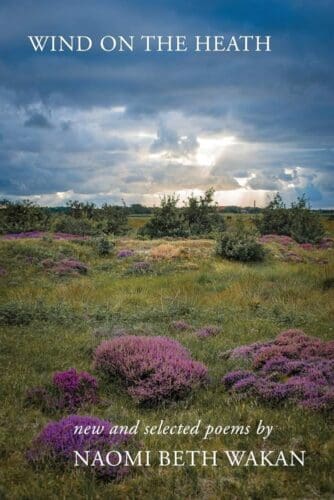Review: Wind on the Heath: new and selected poems by Naomi Beth Wakan
Wind on the Heath: new and selected poems by Naomi Beth Wakan
Shanti Arts Publishing, Brunswick, Maine 2020
Softcover, 219 pages, ISBN 978-1-951651-55-8
$18.95 USD www.shantiarts.com
 Plato said, ‘the unexamined life is not worth living’. The poems in Wind on the Heath are all about the examined life. Naomi Wakan, essayist, psychotherapist and poet laureate has spent a lifetime pondering what it means to be human. Whether written in longer free verse poems, Japanese five-line tanka, or 3-line haiku, nothing escapes her gaze or her questioning mind. She writes with clarity and honesty and does not shy away from the toughest subjects like cancer, aging, relationships. This is a poet who lives her life with eyes wide open. Nothing is beyond reach of her pen. Her poem ‘A dreamer of small dreams’ shows the humble and ever-reaching mind of a poet with an ongoing quest to examine the life she is living. What is clear from this collection of poems is that she was born inquisitive and has remained inquisitive. Whether she is writing about sex or how to cut a rose, these poems offer a bittersweet look at life with irony, humor, deep reflection, and a healthy dose of cynicism. Her poems speak to human nature, to existential aloneness, the fleetingness of life, the pitfalls and hurdles we all must face, and as quoted from “Watchers” one of her earliest poem, this collection offers readers a crack through which we may glimpse reality.
Plato said, ‘the unexamined life is not worth living’. The poems in Wind on the Heath are all about the examined life. Naomi Wakan, essayist, psychotherapist and poet laureate has spent a lifetime pondering what it means to be human. Whether written in longer free verse poems, Japanese five-line tanka, or 3-line haiku, nothing escapes her gaze or her questioning mind. She writes with clarity and honesty and does not shy away from the toughest subjects like cancer, aging, relationships. This is a poet who lives her life with eyes wide open. Nothing is beyond reach of her pen. Her poem ‘A dreamer of small dreams’ shows the humble and ever-reaching mind of a poet with an ongoing quest to examine the life she is living. What is clear from this collection of poems is that she was born inquisitive and has remained inquisitive. Whether she is writing about sex or how to cut a rose, these poems offer a bittersweet look at life with irony, humor, deep reflection, and a healthy dose of cynicism. Her poems speak to human nature, to existential aloneness, the fleetingness of life, the pitfalls and hurdles we all must face, and as quoted from “Watchers” one of her earliest poem, this collection offers readers a crack through which we may glimpse reality.
The first part of the book consists of a selection of poems from four of her poetry books each listed under individual book titles. The last portion of the book consists of newer poems written between 2018 and 2020. Haiku and Tanka are interspersed among free verse poetry in both sections and are frequently written in sequences surrounding a theme. However, tanka, whether alone or written in a sequence are individual five-line poems that can stand alone, unlike free verse which is written in stanzas that move in progression. Her haiku are distilled moments of her life. She excels at the five-line tanka form that speaks to the human condition. Tanka, which dates from the Heian era, 1300 years ago, is one of the fastest growing poetic forms worldwide today and the author’s natural rhythm, wit, and appreciation for the fleetingness of life comes to life in these short poems. Tanka itself means ‘small song’ and were frequently sung in ancient times. Reading the poet’s tanka one recognizes immediately the ease and natural rhythm with which she brings together the two parts of the tanka form, always with a pleasant twist or small epiphany at the end, typical as well of her free verse. One comes away from all her poems with a sense of satisfaction and familiarity as we acknowledge the warp and weave of our own lives through the words of this poet.

The opening poem titled “Virgin in a Tree’, inspired by a Paul Klee drawing, sets the pace for the rest of the book by acknowledging how little we appreciate youth, until it is gone. From then on are poems that turn the common into the extraordinary, whether the poem is free verse, haiku or tanka. This is poetry where words are not wasted, where each word earns its place. The last poem in the book titled ‘Endpapers’, ends with a truly poignant haiku, ‘clouds move / across the skylight / I also drift along’. The tenor of this poem is reminiscent of the famous Japanese death poems.
Naomi Wakan has the extraordinary gift of speaking to her life and at the same time opening our eyes to our own lives. I highly recommend this book.
One Does Not Write
one does not write
because the goldfish play
at the bottom of the waterfall,
but because not everyone
can see them.
Reviewed by:
Carole MacRury, author of In the Company of Crows: Haiku and Tanka Between the Tides
